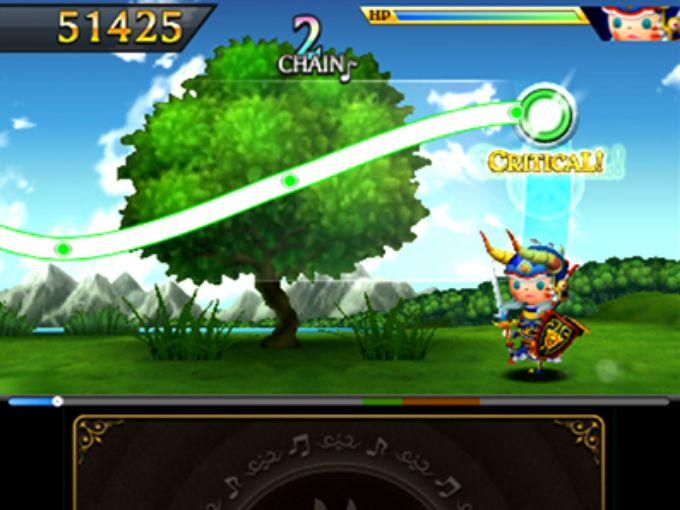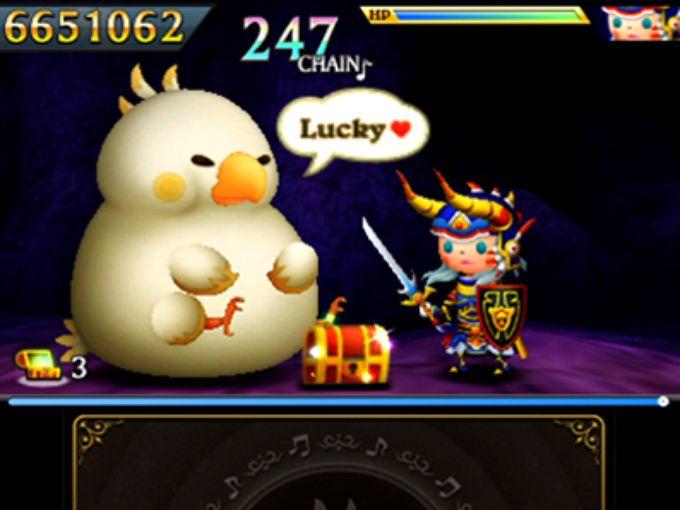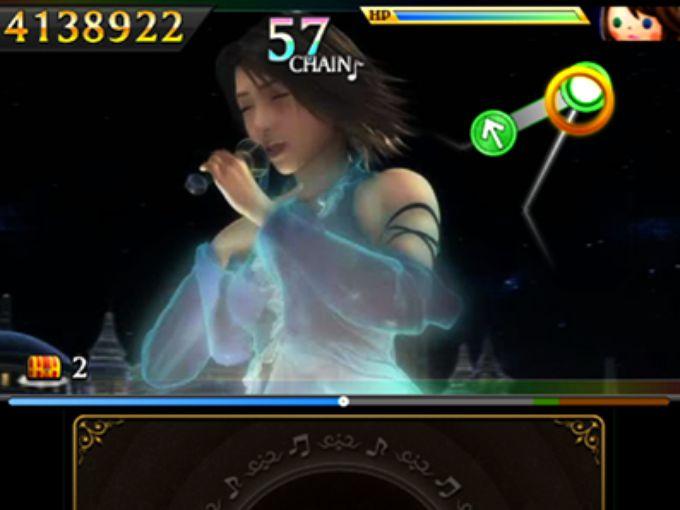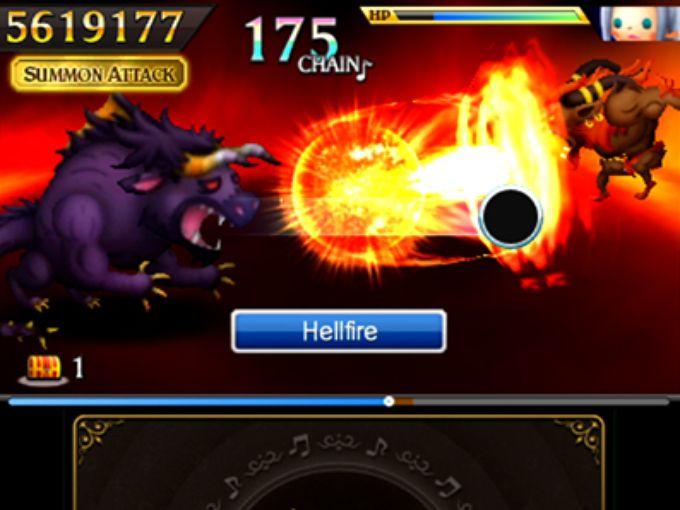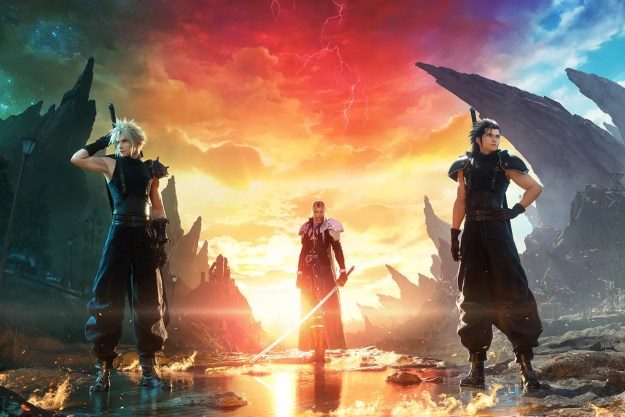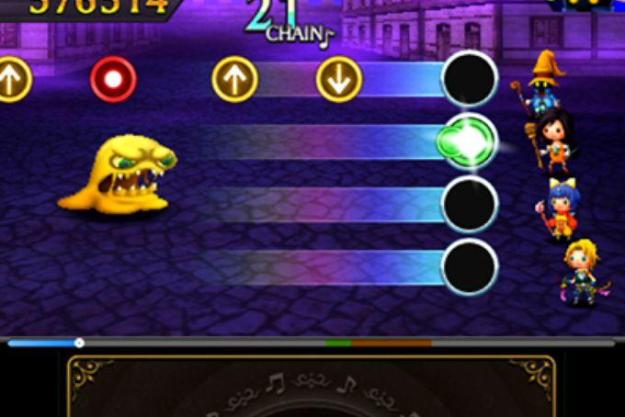
“Curtain Call is a rhythm game filled with artful nostalgia, but elements like the Quests elevate it beyond enjoyable pandering.”
- Vast selection of songs and characters from the Final Fantasy series, including some serious deep cuts.
- Disparate modes like Quest and Versus add surprising variety to a rhythm game.
- Toy box art style never gets too cutesy.
- Event song presentation can get confusing.
Music changes you. That’s not meant to be a dramatic statement, it’s simply the truth. Sound vibrations subtly deform the shape of our bodies and we form deep emotional bonds with melody. So if you find yourself completely mystified as to why the hell people love Final Fantasy enough to justify a rhythm game using its soundtracks, understanding the transformative power of music should help.
Theatrhythm Final Fantasy: Curtain Call for Nintendo 3DS is the result of composers like Nobuo Uematsu, Masashi Hamauzu, and Hitoshi Sakimoto writing music that has, even in small ways, changed people. It’s a wonderfully odd celebration of their work.
Developer indieszero nails the crucial formula for making a pleasurable rhythm game.
Like its predecessor, 2012’s Theatrhythm for 3DS and iOS, Curtain Call is a rhythm game wherein you tap a touchscreen in time with music culled from a quarter-century of Final Fantasy scores. It’s a familiar variation on the timing challenges of music games like Rock Band or PaRappa the Rapper. Little red, green, and yellow dots scroll across the screen from the left. When they pass a reticule on the right, typically in time with the beat in up tempo songs or notes in the melody of a ballad, you tap (red), swipe in an indicated direction (yellow), or press down and hold the note (green). Playing songs earns you Rhythmia, a fancy word for points, and Crystals, which in turn unlock new game modes and characters to use.
Simple? Yes, but no less engaging for it. Developer indieszero nails the crucial formula for making a pleasurable rhythm game, spacing out these inputs in a way that maximizes a feeling of connection with the song being played. Whether basic, expert, or ultimate versions of each song, Curtain Call‘s core play anchors you into its music.
It’s especially impressive considering the significant increase in complexity and frequency of inputs between each difficulty. Keeping up with the insane series of taps and swipes in “Searching for Friends” from Final Fantasy VI on ultimate difficulty makes it feel like your hand might fall off, but it’s equally intoxicating to hit those notes just right and get a perfect SSS rank. (Points are awarded for successfully hitting notes and grades run from F to A then S, SS, and SSS for perfection.)
The songs are only part of Curtain Call’s warm diorama presentation. Most are accompanied by impressively accurate recreations of the landscapes from their original games. Final Fantasy VIII music, like the delicately weird “Blue Fields,” find you walking through the same low-polygon fields outside the Balamb Garden mercenary school, still looking like a military base designed by Georgia O’Keefe.
Meanwhile, you’re always guiding a gang of four characters pulled from the series, including heroes, villains, and deep cut characters like Benjamin from Final Fantasy: Mystic Quest, all of them rendered like rounded paper dolls. Curtain Call’s cutesy character design bumps up against the edge of treacly cuteness, but edges it out with goofy humor. Watching a Raggedy Anne-looking arch bad guy like Jecht from Final Fantasy X fall on his face in the intro scene before a song starts is almost offensively adorable, but it’s also pretty hilarious for a fan.
Make no mistake, too: Fans are who will play this game. Familiarity with Final Fantasy’s history isn’t a pre-requisite for enjoying Curtain Call, but anyone who doesn’t know the difference between Crystal Chronicles and Advent Children – neither of those name is made up, by the way – will undoubtedly feel left out. Series devotees are rewarded with remarkable depth and variety. The aforementioned Crystal Chronicles, a decade-old GameCube exclusive, has playable characters and songs in this package, as does the cultishly adored Final Fantasy Tactics strategy spinoff. It’s fascinating to see the series’ most famous and obscure figures appear in a unified package, but it highlights the distinct strengths of their songs.
Series devotees are rewarded with remarkable depth and variety.
Those songs do sound different. The timpani-fueled marches and horn fanfares of Hitoshi Sakamoto’s work in Final Fantasy Tactics is demonstrably different than Nobuo Uematsu’s prog rock battle tunes from the original NES games, preserved in bleepy form here.
Matching that variety is the presentation. Most are played as either “Field” or “Battle” events. Battle songs show your wee party of four Final Fantasy characters, who can level up just like in the old games, stacked vertically on the right as notes approach from the left. Field songs have one of your characters marching through a scene with just one string of notes to manage, but sustained green notes must be slid up on down on a changing arc like a sine wave.
Less successful are the “Event” songs that have notes and beats appearing in zig-zagging, seemingly random patterns over the flashy CGI sequences from games like Lightning Returns: Final Fantasy XIII. The jagged appearance of the red, yellow, and green dots makes it much harder to maintain that essential connection to the song. Flashy cinemas in the background are also distracting compared to the softer environmental atmospherics in the Field and Battle jams. Luckily, there’s only a smattering of Events in the Curtain Call‘s 200 songs.

There is actually a role-playing component as well amidst all the rhythm action. If you miss too many notes, the party’s health can actually run out and you’ll lose, so picking characters with different stats actually helps, as do items like potions. Agile characters like Vaan do better on Fields, whereas strong fighters and magic users like Lightning and Zach are best saved for battles where they can finish off more enemies before a song ends, thus earning the party more items or bringing down the bosses at the end of Quests.
Quest Mode is actually the best part of Curtain Call. Multi-song playlists presented on map screens with multiple paths, the quests inflect the familiar, core rhythm game play with that feeling of adventure and travel that’s so beguiling in the best Final Fantasy games. Plus, they add strategy. Health doesn’t refill between songs in a Quest playlist unless you have items, so taking on a high level Quest is no easy feat without properly beefed up characters and rhythm skills.
Were Curtain Call just a rhythm game housing artful nostalgia, it would still be a very good entry in a Final Fantasy lover’s 3DS library. Elements like the Quests, or even the Versus Battles you can play against other people online, elevate it beyond enjoyable pandering.
Indieszero has made a new way to engage the music from these games, the studio’s mad aural chemists dropping Uematsu’s lovely “Not Alone” from Final Fantasy IX in alongside the insane bombast of Masashi Hamauzu’s “Blinded By Light” from Final Fantasy XIII. Disparate compositions, but unified by the silken simplicity of Curtain Call‘s play. The music, recontextualized, can change you in new ways. This game was reviewed on a Nintendo 3DS using a code provided by Nintendo.
Highs
- Vast selection of songs and characters from the Final Fantasy series, including some serious deep cuts.
- Disparate modes like Quest and Versus add surprising variety to a rhythm game.
- Toy box art style never gets too cutesy.
Lows
- Event song presentation can get confusing.
Editors' Recommendations
- Tribeca Games 2024 will feature 7 games and a Final Fantasy 7 panel
- Final Fantasy 7 Rebirth: all piano sheet music locations and rewards
- The best ways to farm Gil in Final Fantasy 7 Rebirth
- The best armor in Final Fantasy 7: Rebirth
- Final Fantasy 7 Rebirth preload guide: release time, file size, and preorder
